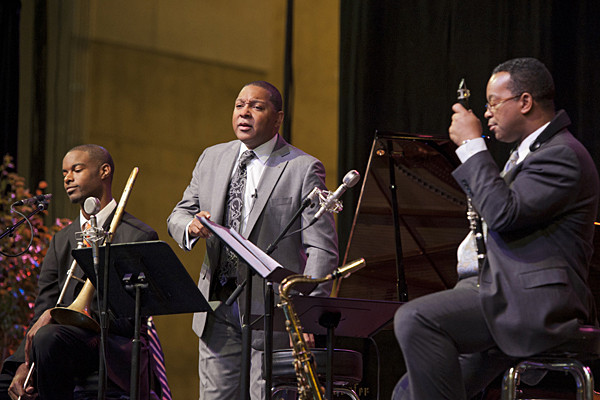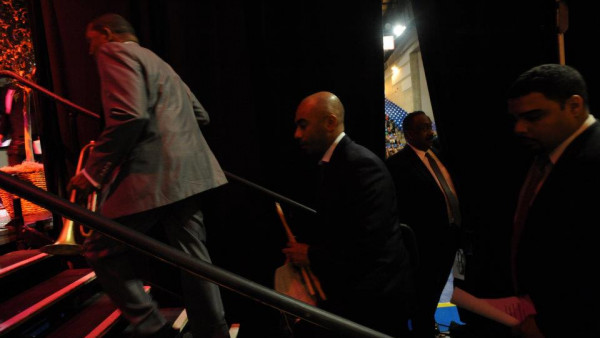Revolutionary Art at University of Delaware

Wynton giving his lecture at University of Delaware
Wynton Marsalis believes that the revolutionary spirit of the Founding Fathers lives on in the truly American art forms of jazz, swing and the blues.
The Pulitzer Prize and National Medal of the Arts honoree brought his music and his observations on America’s cultural legacy to the Bob Carpenter Center on Wednesday, Nov. 2, as part of the UD Speaks series. The series is dedicated to bringing world-class leaders to the Delaware campus to educate, enlighten and engage the University community.
“The Ballad of the American Arts: An Evening with Wynton Marsalis” began with a standing ovation by an audience of 1,436 students and community members who came to hear the internationally acclaimed musician, composer, bandleader, educator and leading advocate of American culture.
Making music with Marsalis were Carlos Henriquez, bass; Ali Jackson, drums; Dan Nimmer, piano; Victor Goines, sax; and Chris Crehshaw, trombone.
Toe tapping selections ranged from “Yankee Doodle,” “Now’s the Time,” “Battle Hymn of the Republic,” “Washington Post” and “Didn’t He Ramble” to “Mickey Mouse Theme,” “Buddy Bolden Blues,” “Aunt Hager’s Blues” and “Benny’s Bugle.”
Marsalis punctuated these crowd-pleasing favorites with his view of American musical history and his hopes for a renewed interest in the arts across the nation.
“In the last 50 years, we’ve looked everywhere to correct our cultural decline except in the most obvious of places, the center of our real lives,” Marsalis said. “Our internal lives and those of our students are under relentless assault by an increasingly crass entertainment industry that routinely confuses commercial success with quality.”
The arts, Marsalis noted, offer a cultural solution to this situation by providing a time-tested blueprint based on class, creativity, confidence and competence.
“Before we sang, we spoke; before we danced, we walked; before we wrote, we told stories; and before we told those stories, we lived,” Marsalis said. “Such songs and dances allow us to speak to one another across generations. They also give us an understanding of our commonality.”
Marsalis said that the cultural legacy represented in jazz, blues and swing reflects the spirit and wisdom of those individuals who created a new nation in 1776.
“Our Founding Fathers had to write a document that would last through the ages,” Marsalis said. “America is still revolutionary, and we are still free to put ourselves in the life we want to live.”
Although not always commercially successful or critically acclaimed, this American creativity has found expression in the writing of Walt Whitman, Edgar Allan Poe, Herman Melville and the art of Winslow Homer, Marsalis said.
“We’re all from the same experience,” Marsalis said. “Homer painted black folks with dignity, and Poe sang the blues before there was any blues.”
Marsalis said that the American Revolution as expressed in the creative arts continued to unfurl with a rich cultural experience, including the music of jazz cofounder Charles Joseph Bolden of New Orleans.
“People would say, ‘Hey Buddy Bolden, play us a tune!’” Marsalis said. “The music was blues, so the people danced with feeling, and it was jazz, so the people danced with accuracy, and it was improvised too. You can’t ask for much more than that.”
Musical pioneers who built on this legacy included Charlie Parker, Dizzy Gillespie, Thelonious Monk, Benny Goodman, Fletcher Henderson and Louis Armstrong, Marsalis said.
“There was an urgency and speed to their music, which also was a declaration of independence,” Marsalis said. “They created new schools of American virtuosity.”
Marsalis also expressed his displeasure for artificially produced music symbolized by the use of drum machines instead of live musicians, and the placing of the arts at the bottom of the list when it comes to public support.
“Every arts program has been cut in the schools,” Marsalis said. “We are a nation that has forgot how to dance.”
Although America is a sometimes unpredictable, unruly land with many diverse peoples, the blueprint for its cultural renaissance can be found within its collective mind and soul, Marsalis said.
“Now is the time to realize this is our song,” Marsalis said. “The song will tell us who we are. It’s all we need to know. It’s all we will ever need to know.”
Following a question and answer period, the program concluded with another standing ovation for Marsalis and his fellow musicians.
by Jerry Rhodes
Source: University of Delaware

